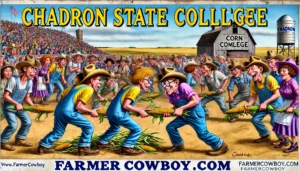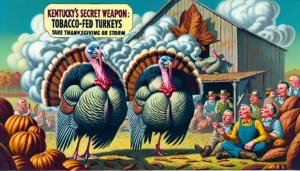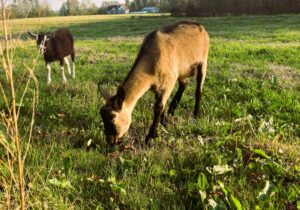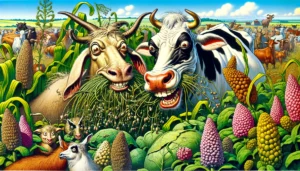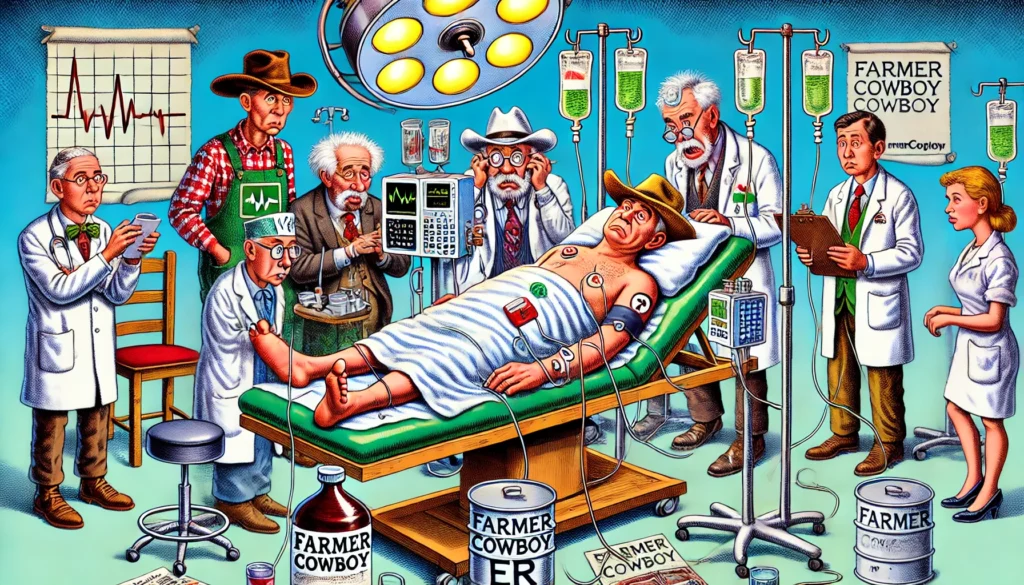
Farm Recession A humorous and exaggerated illustration in the style of FarmerCowboy.com featuring a farmer lying on an operating table with IV fluids and various health4.webp.webp
The Corn Price Conundrum
In the heart of the American Midwest, where fields stretch farther than the eye can see and the horizon is dotted with silos and barns, a quiet crisis is unfolding. The U.S. Farm Recession, as it’s come to be known, is turning the agricultural world upside down, and not in a good way. But in true farmer fashion, where humor is the last defense against despair, this crisis is also giving rise to some darkly comedic observations.
Take, for example, the “Corn Price Conundrum.” Who knew that in 2024, corn—America’s golden crop—could be worth less than a bucket of movie theater popcorn? Farmers across the Corn Belt are scratching their heads and wondering if they’ll soon have to start paying customers to haul it away like unwanted furniture. “I’ve got a pile of corn taller than my barn,” says Iowa farmer John Doe. “At this rate, I might just set up a ‘Take a Bushel, Leave a Bushel’ stand out front.” Corn prices have sunk so low that some farmers are joking about turning their fields into giant maize mazes just to get some foot traffic. But it’s not just a joke—agricultural economists are warning that the plummeting prices could spell disaster for small and mid-sized farms. According to the latest USDA report, corn prices have dropped by 15% over the last year alone, and the downward trend shows no signs of stopping.

Farmers: The New Economists
This brings us to the “Farmers: The New Economists” phenomenon. While Ivy League-educated economists sit in their climate-controlled offices debating inflation and GDP, farmers are out in the fields making real-time economic decisions that would make any Wall Street analyst sweat. “We’re living the recession that Biden and Harris caused,” says John Smith, a third-generation farmer from Kansas. “I wish we had a farmer in the Federal Reserve. They’d know what’s really going on out here.”
Indeed, farmers are becoming better economists than the economists themselves. They’ve been forced to navigate the complexities of commodity markets, input costs, and global trade dynamics, all while dealing with the whims of Mother Nature. “It’s like playing poker with a deck that’s constantly changing,” says Sarah Green, a soybean farmer in Illinois. “You’ve got to be on your toes, or you’ll lose it all.” The reality is that farmers have become some of the most knowledgeable and adaptive participants in the economy—by necessity, not choice.

The Cattle Economy Lifeline
Thank goodness for cattle prices. If it weren’t for those four-legged saviors, the ag economy would be flatter than a pancake on a Sunday morning breakfast plate. “Cattle prices are the only thing keeping me afloat,” says Mike Johnson, a cattle rancher in Texas. “If I didn’t have my herd, I’d be out of business by now.”
The beef market has remained surprisingly strong, even as other sectors of agriculture have faltered. Experts attribute this to a combination of strong domestic demand and international exports. “Cattle are the new cash crop,” says Dr. Emily Thompson, an agricultural economist. “While crop prices are plummeting, cattle prices have stayed robust, providing a crucial lifeline for many farmers.”
In some cases, cattle have become the primary source of income for farmers who used to rely on crops. “I never thought I’d be more of a cattleman than a corn farmer,” says Johnson. “But here we are, and I’m not complaining.”
Cattle: The New Bitcoin
Speaking of cattle, it seems like they’ve become the new Bitcoin of the agricultural world. “My cows are worth more than my crypto portfolio,” jokes Mark Taylor, a farmer who dabbles in both digital currency and livestock. “Maybe I should start trading them on Wall Street.”
Cattle prices are so strong that they’re being compared to the speculative boom of Bitcoin. “It’s like we accidentally invested in the Bitcoin of bovines,” says Taylor. “I just hope the bubble doesn’t burst.” Financial analysts have even started to take notice, with some suggesting that cattle might be a more stable investment than the volatile cryptocurrency market. “At least cows give you something tangible,” says financial advisor Ben Johnson. “You can’t milk a Bitcoin.”

Crop Prices: The Latest Installment of ‘Falling Skies’
Meanwhile, over in the world of crops, things are looking decidedly grim. Corn and soybean prices are falling faster than the plot of a bad sci-fi movie. “It’s like we’re living in the latest installment of ‘Falling Skies,’” says farmer Jane Doe. “Every time I check the markets, it’s worse than the last episode.”
The collapse in crop prices has been so dramatic that some farmers are starting to wonder if they’ll soon be featured in a Netflix drama titled “The Disappearing Dollar.” “It’s a horror story, that’s for sure,” says Doe. “And we’re the unpaid actors.”
Analysts are blaming a combination of factors, including oversupply, weakening demand, and trade tensions. “It’s a perfect storm,” says Dr. Thompson. “And unfortunately, it’s the farmers who are getting caught in the middle.”

Farmers: The Unpaid Actors in the Economic Tragedy
Indeed, farmers are starring in the latest economic drama, “Recession: The Sequel.” Except this time, the budget is even smaller, and the special effects are just sad crop yields. “We’re the unpaid actors in this tragedy,” says Sarah Green. “And it feels like the script just keeps getting worse.”
Every day, farmers wake up to a new plot twist in their economic horror story. “Just when you think it can’t get any worse, it does,” says Green. “It’s like being stuck in a never-ending sequel.”
The truth is that farmers have been hit hard by the recession, and there’s no end in sight. “We’re just trying to survive,” says Green. “But it’s getting harder every day.”

The Farm Income Cliff
Farm income has become the cliffhanger in a suspense novel. Every month, we’re left wondering, “Will it drop further?” Spoiler alert: Yes, it will. “It’s like waiting for the other shoe to drop,” says Mike Johnson. “Except it’s more like waiting for the whole closet to collapse on you.”
The decline in farm income has been steady and relentless. “We’ve seen a 20% drop in income over the last year,” says Dr. Thompson. “And it’s only going to get worse.” For many farmers, this cliffhanger is turning into a freefall, and there’s no safety net in sight. “We’re hanging on by a thread,” says Johnson. “And that thread is fraying fast.”

The Cash Receipt Diet
Farmers are on a strict diet of lower cash receipts. Unfortunately, this isn’t the kind of diet that gets you beach-ready—it’s more like preparing for hibernation. “We’re in survival mode,” says Sarah Green. “And that means cutting costs wherever we can.”
The reality is that many farmers are being forced to tighten their belts and make do with less. “It’s like being on a crash diet,” says Green. “Except there’s no cheat day.”
Experts warn that this cash receipt diet could have long-term consequences for the agricultural industry. “If farmers can’t invest in their operations, we could see a decline in productivity,” says Dr. Thompson. “And that could have ripple effects throughout the economy.”

The Soybean Apocalypse
In another cruel twist of fate, soybeans are hitting record crops, but prices are sinking. “It’s like growing the best garden ever and finding out everyone’s allergic to vegetables,” says Rick Bean, a soybean farmer in Illinois. “What’s the point of having a bumper crop if you can’t sell it?”
The soybean apocalypse, as it’s being called, is the result of a perfect storm of factors, including oversupply and weakening demand. “We’ve got more soybeans than we know what to do with,” says Bean. “And nobody seems to want them.”
Analysts warn that the soybean apocalypse could have serious consequences for farmers. “If prices don’t rebound, we could see a wave of farm bankruptcies,” says Dr. Thompson. “And that could have a ripple effect throughout the economy.”
The Ag Economist Crystal Ball
Ag economists might want to trade in their crystal balls for a pair of reading glasses—because apparently, 50% of them just noticed we’re already in a recession. Better late than never! “It’s like they’re finally waking up to what we’ve been living for the last year,” says Mike Johnson. “Maybe they should spend some time out here in the real world.”
The delayed reaction from economists has left many farmers feeling frustrated and ignored. “We’ve been shouting from the rooftops that things are bad,” says Sarah Green. “But nobody seems to be listening.”
Experts warn that this disconnect between economists and farmers could have serious consequences. “If policymakers don’t understand what’s really happening on the ground, they’re going to make the wrong decisions,” says Dr. Thompson. “And that could make a bad situation even worse.”
Sustainable Farming Costs: The Latest Horror Show
Farmers are being pressured to be more sustainable, which sounds great until you realize it’s like being asked to run a marathon while carrying a boulder—oh, and by the way, the boulder just got heavier. “I’m all for sustainability,” says Rick Bean. “But it’s hard to go green when you’re seeing red.”
The reality is that sustainable farming practices often come with higher costs, and many farmers simply can’t afford to make the switch. “It’s like being asked to build a house with one hand tied behind your back,” says Bean. “It’s just not realistic.”
Experts warn that this push for sustainability could have unintended consequences. “If we push too hard, we could end up driving more farmers out of business,” says Dr. Thompson. “And that would be a disaster for everyone.”
The Election Rollercoaster
Economists say we’ll officially enter a recession after the election, as if the election is some kind of magic switch. So, should we vote for rain to make the crops grow next year? “It’s like they think the economy is a light switch they can just flip on and off,” says Mike Johnson. “But out here, we know better.”
The reality is that the agricultural economy is already in a recession, regardless of what the economists say. “We’ve been living it for months,” says Sarah Green. “And it doesn’t matter who wins the election—it’s not going to change things overnight.”
Experts warn that the election rollercoaster could create even more uncertainty for farmers. “If we don’t get some clarity soon, we could see a lot of farmers throwing in the towel,” says Dr. Thompson. “And that would be a tragedy for the entire country.”

Vertical Integration: The Crop Farming Soap Opera
The latest plot twist in farming? Vertical integration. It’s like watching a soap opera where all the characters get bought out by the same shady conglomerate. “Every time I turn around, another farm is getting swallowed up,” says Rick Bean. “It’s like we’re living in a bad episode of ‘As the World Turns.’”
The trend towards vertical integration is creating serious concerns for independent farmers. “We’re losing our independence,” says Bean. “And once it’s gone, we’re never getting it back.”
Experts warn that vertical integration could have serious consequences for the agricultural industry. “If we lose too many independent farmers, we could see a decline in innovation and competition,” says Dr. Thompson. “And that would be bad for everyone.”
Government Programs: The Ghostbusters of Farming
When farm incomes drop, who you gonna call? Apparently, not ARC/PLC—they’re about as effective as calling a ghostbuster to fix your plumbing. “I tried applying for help,” says Sarah Green. “But all I got was a bunch of paperwork and a pat on the back.”
The reality is that many government programs meant to help farmers are falling short. “They’re not designed for the real world,” says Green. “And by the time you actually get the money, it’s too late.”
Experts warn that these ineffective programs could have serious consequences for the agricultural industry. “If farmers can’t rely on government support, we could see a lot more of them going out of business,” says Dr. Thompson. “And that would be a disaster for everyone.”
Cattle Prices: The Last Hope
Cattle prices are like the last lifeboat on a sinking ship, except that ship is the entire agricultural economy, and there’s not enough room for everyone. “It’s the only thing keeping me afloat,” says Mike Johnson. “But I know not everyone is so lucky.”
The strong cattle market has provided a lifeline for some farmers, but it’s not enough to save the entire industry. “We can’t all rely on cattle,” says Johnson. “And if prices start to drop, we’re all in trouble.”
Experts warn that the reliance on cattle prices could be a dangerous gamble. “If the market shifts, we could see a lot of farmers left with nothing,” says Dr. Thompson. “And that would be a tragedy for the entire country.”
Helpful Insights for the Resilient Farmer and Cowboy:
Navigating this landscape requires a blend of humor, grit, and an uncanny ability to find silver linings. Diversifying crops, exploring niche markets like organic or direct sales, and leveraging technology to reduce costs might just turn the tide. Remember, every challenge is an opportunity in disguise—sometimes, you just have to squint a bit harder to see it.

Disclaimer:
This article is a product of creative collaboration between the pen and the plow. No economists, livestock, or cornstalks were harmed in the making of this satire. All depicted scenarios are so exaggerated that even the most gullible shouldn’t take them at face value. Enjoy the read, and take the advice with a pinch of salt—preferably while seated comfortably on a tractor or horseback. This satire is not just a reflection on the grim realities of the U.S. farm recession but a humorous take on how farmers, ever resilient, manage to find laughter amidst their struggles. However, behind the jokes and satire lies a stark truth: the agricultural sector is in trouble, and unless something changes, the consequences could ripple far beyond the fields.
Originally Published at FarmerCowboy.com
2024-08-28 15:59:11
Karl Hoffman is a distinguished agriculturalist with over four decades of experience in sustainable farming practices. He holds a Ph.D. in Agronomy from Cornell University and has made significant contributions as a professor at Iowa State University. Hoffman’s groundbreaking research on integrated pest management and soil health has revolutionized modern agriculture. As a respected farm journalist, his column “Field Notes with Karl Hoffman” and his blog “The Modern Farmer” provide insightful, practical advice to a global audience. Hoffman’s work with the USDA and the United Nations FAO has enhanced food security worldwide. His awards include the USDA’s Distinguished Service Award and the World Food Prize, reflecting his profound impact on agriculture and sustainability.
